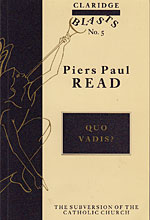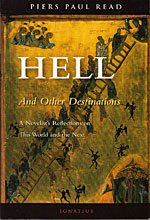Other
Quo Vadis. The Subversion of the Catholic Church. Blast No. 5. The Claridge Press, London, 1991.
 What do Catholics believe? The call for a decade of evangelisation in 1990 came at a time when there is as much confusion about doctrine as at any time since the Reformation. What Alain Besançon said of France was equally true of England: `Within the Catholic world today, there is a divergence among some authors that is far wider than the gap which separated Calvin from Council of Trent but the church adopts no position. It does not say what is true and what is false’.
What do Catholics believe? The call for a decade of evangelisation in 1990 came at a time when there is as much confusion about doctrine as at any time since the Reformation. What Alain Besançon said of France was equally true of England: `Within the Catholic world today, there is a divergence among some authors that is far wider than the gap which separated Calvin from Council of Trent but the church adopts no position. It does not say what is true and what is false’.
Quo Vadis was a pamphlet of less than fifty pages published by Roger Scruton in the series of Blasts by his Claridge Press. I had met Scruton a few years earlier when he had arranged me to go to Czechoslovakia and contribute to his underground university. He was not a Catholic but was sympathetic to my belief that the Church’s teaching was being diluted and even reversed by dissident theologians and catechists in Britain. There was, it seemed, an alternative magisterium which our bishops did nothing to refute. Clearly, a comparable anxiety was felt in the Vatican and in three years later, despite strong opposition of liberal Catholics, traditional teaching was affirmed in a new Catechism of the Catholic Church.
Hell and Other Destinations. A Novelist’s Reflections on This World and the Next. Darton, Longman & Todd. London, 2006.
 The first and longest essay in this collection asks why the age-old teaching of the Catholic Church, that serious sinners who die unrepentant will go to Hell, has been forgotten. Further essays, articles and book reviews written over thirty years deal with faith, the Church, Liberation Theology, History, Sex and Marriage, Writers and Saints.
The first and longest essay in this collection asks why the age-old teaching of the Catholic Church, that serious sinners who die unrepentant will go to Hell, has been forgotten. Further essays, articles and book reviews written over thirty years deal with faith, the Church, Liberation Theology, History, Sex and Marriage, Writers and Saints.
The Penny Catechism which formed the basis of my religious education at Ampleforth stated unambiguously that those who died unrepentant in a state of mortal sin would go to Hell. It left me with same anxiety that had motivated Catholics throughout the history of the Church until after Vatican II when, without a reason being given, it had somehow faded from Catholic teaching like the smile of the Cheshire cat.
Invited to prepare a talk to be given at the Jesuit Church at Farm Street, I chose Hell as my topic and asked rhetorically, in an essay, whether our insouciance about the possibility of damnation was justified. In the event, I was stood down as a speaker but Brendan Walsh, the publisher at Darton, Longman & Todd, suggested that I combine the essay in a volume of my collected journalism. The book went largely unnoticed in Britain where Catholics who buy books tend to be of a liberal persuasion; but did better in the United States where it appeared under the imprint of the Ignatius Press – a publisher with loyal customers among orthodox Catholics. Ignatius would later publish my theological thriller, The Death of a Pope.
to topShort Stories
- 1970 `The Cruise`: Queen Magazine
- 1972 `The Inconsistency of Women`: The Times
- 1973 `The Architect and the Goat`: The Times
- 1977 `The Browning Committee`: Spectator
- 1982 `Home Truths`: Woman's Own.
- 1986 `Son and Heir`: Winters Tales.
- 1990 `A Picture of Alexandra`: Telegraph Magazine: published as `Family Christmas` in Winters Tales, 1991.
Essays
- 1977 `My Cambridge`. Edited by Ronald Hayman. Robson Books.
- 1981 `Ryedale` in Places: an anthology of Britain. Edited by Ronald Blythe. Oxford University Press.
- 1982 `Upon this Rock` in Why I am still a Catholic. Edited by Robert Nowell, Collins, London.
- 1984 Writing in the Eighties. The Author, London.
- 1984 `The Danube` in Great Rivers of the World. Edited by Alexander Frater. Hodder and Stoughton, London.
- 1986 `Rich Man, Poor Man`. The Tablet, London.
- 1987 `Sex and Sin`. Spectator, London.
- 1988 `Come gli inglesi vedono il Papa` in Giovanni Paolo II: pellegrino per il Vangelo. Edizioni Paoline-Editrice SAIE
- 1989 `A Married Man` in Writers Revealed. Edited by Rosemary Hartill. BBC Books.
- 1993 `Exploding the Myth of Chernobyl’, Spectator Annual. HarperCollins.
- 1994 Come On In...It's Awful. Edited by Joanna Bogle. Gracewing. Fowler Wright Books.
- 1994 Introduction to Endurance by Alfred Lansing, The Adventure Library, Purdys, New York.
- 1996 Introduction to The Innocent Eye by Herbert Read, Smith Settle, York
- 1997 Foreword to The Gospel of St. John, Lion Publishing, London, St. Martin's Press, New York
- 1997 `The Dilemma of a Catholic Novelist in a Secular Society`. In New Developments in English and American Studies: Continuity and Change, Krakow, Jagiellonian University, Insititute of English Philology.
- 1999 Introduction to The Wisdom of Solomon. Canongate Books, Edinburgh
- 1999 Piers Paul Read on the future of the Church, AD 2000, Melbourne, November, 1999
Plays and Screenplays
- 1964 The Class War, in Colloquialisms
- 1967 Verbrechen mit Vorbedacht: film directed by Peter Lilienthal, Berlin.
- 1970 Coincidence, BBC TV
- The Family Firm, BBC Radio
- 1971 The House on Highburgh Hill, BBC Radio and TV
- 1974 The Childhood Friend, BBC TV
- 1977 Margaret Clitheroe, Grandada TV
Screen adaptations
- 1984 A Married Man. London Weekend Television.
- 1988 The Free Frenchman. Central Television.
- 1993 Alive. Touchstone Pictures. Produced by Kathleen < Kennedy. Directed by Frank Marshal.
- 1998 Monk Dawson. Directed by Tom Waller
Critical essays/ References
- Philip Flynn: `Piers Paul Read`. Dictionary of Literary Biography, U.S.A.
- Adrian Gray: `Spelling Out Sin`. Third Way.
- Phil McCombs: `The Passions of Piers Paul Read`. Washington Post.
- Valentina Ivasheva: `Piers Paul Read`. Progress Publishing, Moscow.
- Michael D. Aeschliman: `Light in the Mirror`. The World and I. Washington, November, 1989.
- C.J. Taylor: `The Novels of Piers Paul Read`. Spectator, 23 February, 1990.
- Thomas Woodman: Faithful Fictions: The Catholic Novel in British Literature. Open University Press, Milton Keynes and Philadelphia. 1991
- Roland Hill: Der Romancier als Advocatus Diaboli: das Werk des Englanders Piers Paul Read. Communio, Heft 5/91, September 1991.
- Natalia Boushmanova: `When Shakespeare lives in the Mind`. Questions of Literature, Moscow, February, 1991.
- Roland Hill: `The Artist's Dilemma’. Catholic World Report, San Francisco. March, 1992, Vol 2, No.3.
- Allan Massie: `Death on the Shelf. Have English novelists lost the plot?’ Weekend Telegraph. 16 October 1993.
- Marian E. Crowe. `A Modern Psychomachia: The Catholic Fiction of Piers
- Paul Read’. Christianity and Literature, Vol 47, No. 3 (Spring 1998)
- John W. Mahon. `Whither the Catholic novel?` The Month, February, 1999.
- Dan McAloon, `Talking about a Revolution’, Catholic Weekly, Sydney, October 24, 1999
- Marian E. Crowe. Aiming at Heaven, Getting the Earth. The English Catholic Novel Today. Lexington Books, 2007